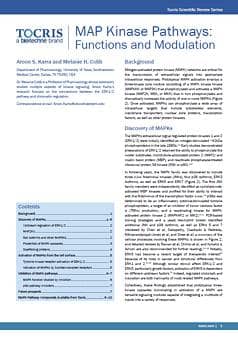p38 MAPK
p38 kinases are a group of mitogen-activated protein kinases (MAPKs). Like JNK/c-Jun, the p38 kinases are responsive to stresses such as osmotic shock and cytokine stimulation; consequently they are also classified as stress-activated protein kinases (SAPKs).
p38 MAPK Inhibitors |
|
|---|---|
| Cat. No. | 产品名称/活性 |
| 6712 | A 77-01 |
| p38 MAPK inhibitor; also potent TGF-βRI inhibitor | |
| 3920 | AMG 548 |
| Potent and selective p38α inhibitor | |
| 5989 | BIRB 796 |
| High affinity and selective p38 kinase inhibitor | |
| 2186 | CMPD-1 |
| Selective inhibitor of p38α-mediated MK2a phosphorylation; also tubulin polymerization inhibitor | |
| 5095 | DBM 1285 dihydrochloride |
| p38 MAPK inhibitor; anti-inflammatory | |
| 2908 | EO 1428 |
| Selective inhibitor of p38α and p38β2 | |
| 5866 | PH 797804 |
| Potent and selective p38α/β inhibitor | |
| 2999 | RWJ 67657 |
| Potent, selective p38α and p38β inhibitor | |
| 1264 | SB 202190 |
| Potent, selective inhibitor of p38 MAPK | |
| 1202 | SB 203580 |
| Selective inhibitor of p38 MAPK | |
| 1402 | SB 203580 hydrochloride |
| Selective inhibitor of p38 MAPK; water-soluble | |
| 1962 | SB 239063 |
| Potent, selective p38 MAPK inhibitor; orally active | |
| 5040 | SB 706504 |
| p38 MAPK inhibitor | |
| 3528 | SCIO 469 hydrochloride |
| Selective p38 MAPK inhibitor | |
| 4254 | TAK 715 |
| Potent p38 MAPK inhibitor; anti-inflammatory | |
| 3915 | VX 745 |
| Potent and selective p38α inhibitor | |
Degraders |
|
| Cat. No. | 产品名称/活性 |
| 7177 | NR 7h |
| Potent and selective p38α and p38β Degrader; active in vivo | |
| 7268 | SJFα |
| Potent and selective p38α Degrader | |
| 7267 | SJFδ |
| Potent and selective p38δ Degrader | |
p38 kinases are a group of mitogen-activated protein kinases (MAPKs). Like JNK/c-Jun, the p38 kinases are responsive to stress stimuli such as osmotic shock and cytokine stimulation; they are also classified as stress-activated protein kinases (SAPKs). p38 also responds to insulin and growth factor stimulation and is often activated during normal immune and inflammatory responses. The active form of p38 phosphorylates specific cellular targets and also regulates gene expression via activation of specific transcription factors.
There are four isoforms of p38: α-, β-, γ- and δ. p38α and β are ubiquitously expressed, while the expression of p38γ and p38δ varies between tissue types. Activation of p38α is dependent on both stimulus and cell type; however, all isoforms of p38 are activated by MAPKKs - in particular, MKK3 and MKK6. Downstream targets of p38α and β include protein kinases such as MAPKAPK2 (MK2) and MNK1, and a range of transcription factors.
p38 has been linked to numerous cellular processes, including inflammation, apoptosis, and the cell cycle. In recent years, p38 has been isolated as a major therapeutic target for the treatment of rheumatoid arthritis.
External sources of pharmacological information for p38 MAPK :
Literature for p38 MAPK
Tocris offers the following scientific literature for p38 MAPK to showcase our products. We invite you to request* your copy today!
*Please note that Tocris will only send literature to established scientific business / institute addresses.
MAPK Signaling Scientific Review
MAP kinase signaling is integral to the regulation of numerous cellular processes such as proliferation and differentiation, and as a result is an important focus of cancer and immunology research. Updated for 2016, this review discusses the regulation of the MAPK pathway and properties of MAPK cascades. Compounds available from Tocris are listed.
Pathways for p38 MAPK
MAPK Signaling Pathway
The mitogen-activated protein kinase pathway evokes an intracellular signaling cascade in response to extracellular stimuli such as heat and stress. It can influence cell division, metabolism and survival.p38 MAPK Gene Data
| Gene | Species | Gene Symbol | Gene Accession No. | Protein Accession No. |
|---|---|---|---|---|
| p38α | Human | MAPK14 | NM_001315 | Q16539 |
| Mouse | Mapk14 | NM_011951 | P47811 | |
| Rat | Mapk14 | NM_031020 | P70618 | |
| p38β | Human | MAPK11 | NM_002751 | Q15759 |
| Mouse | Mapk11 | NM_011161 | Q9WUI1 | |
| p38δ | Human | MAPK13 | NM_002754 | O15264 |
| Mouse | Mapk13 | NM_011950 | Q9Z1B7 | |
| Rat | Mapk13 | NM_019231 | Q32Q45 | |
| p38γ | Human | MAPK12 | NM_002969 | P53778 |
| Mouse | Mapk12 | NM_013871 | O08911 | |
| Rat | Mapk12 | NM_021746 | Q63538 |

